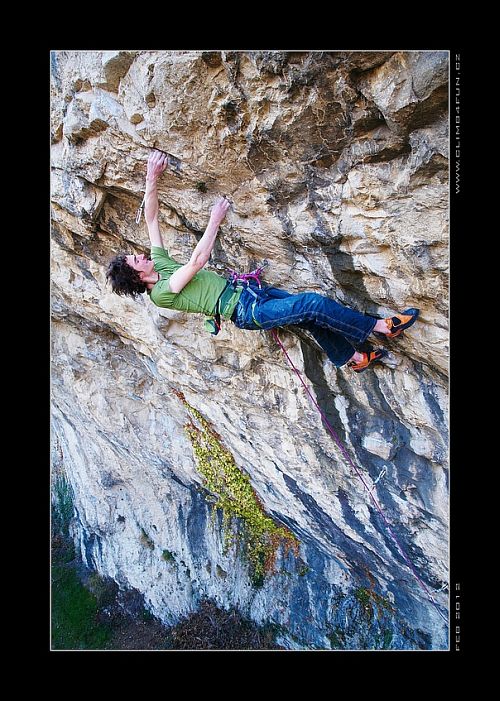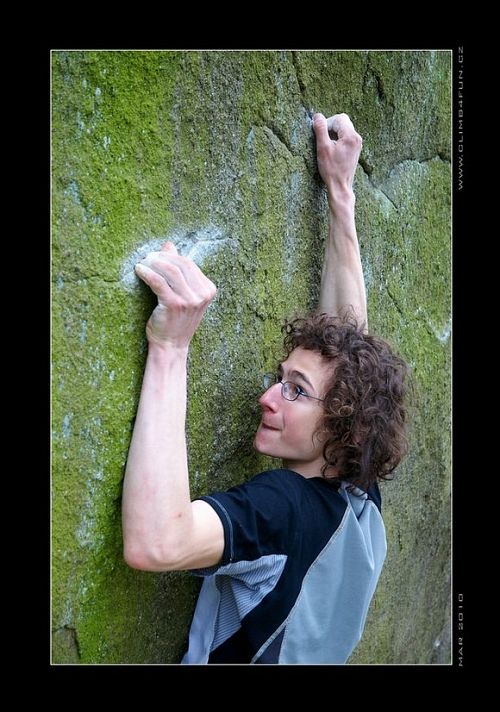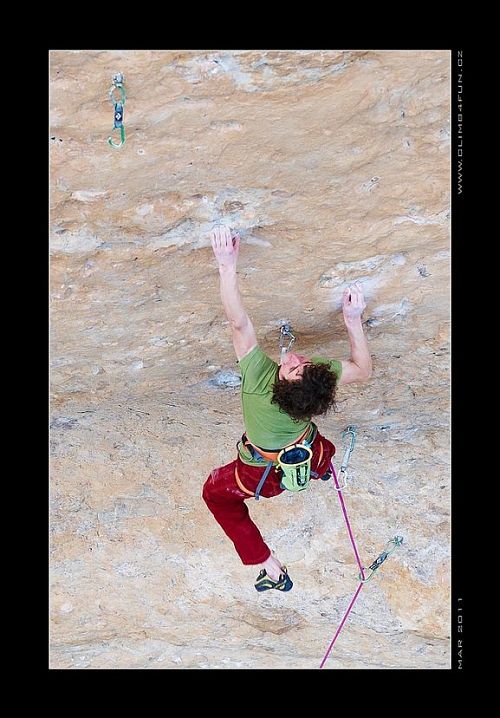Their insights into the game that we all find so compelling and which they have redefined the limits of are invaluable to climbers of all abilities. For my part I have always tried to avoid the softball questions about routes, grades or projects that are the typical fodder of climbing magazines and websites. I have always wanted to go a little deeper into their mental and psychological worlds instead.
One of the most compelling climbers today in this regard is Adam Ondra. While clearly an athlete of the highest caliber, he has also clearly tapped into mental and psychological resources that have enabled an incredibly concentrated series of ascents in the 5.14c and up range in the past few years as well as notable success in the much more specialized game of bouldering. I have written about Adam in the past but never met him or contacted him before.
 Adam Ondra in Macumba Club, 8c, Orgon
photo by © Vojtěch Vrzba (climb4fun.cz)
Adam Ondra in Macumba Club, 8c, Orgon
photo by © Vojtěch Vrzba (climb4fun.cz)
A few months ago I got the crazy idea that I would email Adam Ondra and ask if he would be interested in answering a few questions about climbing, not focusing on the names and grades or numbers of tries but instead on his individual ideas about the sport and especially on the mental game which every serious climber recognizes is the key to progression. Thanks to an introduction from a contact in the Czech scene, Adam agreed to help out.
I want to add that Adam, in doing this interview, showed why he is truly a professional, even at a very young age. These questions were answered in the middle of a trip to Spain, when most “pro” climbers would not even bother answering an email from the author of an obscure climbing blog. Not only did Adam did answer the email, but his answers (composed in his non-native English and only lightly edited by me) are of the highest quality and give invaluable insight to anyone wondering what it means to climb at the very highest level.
To climbers worldwide the name Adam Ondra needs little introduction. Having redpointed 5.14d (9a) by age 13 and rapidly repeating as well as FAing a wide array of European sportclimbing testpieces in all styles, Adam then tried bouldering and just as quickly found himself flashing V13 (8B) and redpointing V15 (8C), even possibly V16 late last year with his ascents of Gioia and his own problem Terranova in the Czech Republic. There are the serious 5.14 multipitch routes in Switzerland and Madagascar. And there are the numerous 5.14b and c onsights as well being World Cup champion in 2009. Even a summary review of his most significant climbs would take up more space than this interview. His scorecard at 8a.nu tells the whole story.
Yet to an outside observer, the most remarkable thing is the degree to which this relentless pace of successes on brutally difficult climbs appears to be offset by a personality that is low key, unassuming and free of the attitude that too often accompanies high-level climbers. Watching him climb in the numerous videos out there, I have been long impressed by his pragmatic, decisive and ruthlessly effective climbing style, free of any self-conscious or self-aware displays of strength or ability. He simply gets the job done.
In light of his record and the obvious implication that he is only getting started, in my view, he is simply the best all-around rock climber on the planet. It is therefore with great pleasure that I invite you to read this interview to learn more about Ondra’s views on the sport of climbing.
You started climbing at a very high standard (8b onsight by age 12, 9a RP by 13) when you were quite young. It seems clear to me that physical training alone could not have pushed you so far so fast. Can you remember how you felt about climbing then and what you understood about the sport at that time so that you felt able to achieve these ascents?
I have always taken climbing really seriously. Climbing hard and obtaining my goals has always been very important. It was very difficult to admit failure and I did get frustrated. But at same time, it has always been a perfect and beautiful game to play. I couldn't wait to get myself on the rock. At that time, I climbed and trained to be strong, but at the same I would not dare doing something I did not really enjoy. The attitude towards climbing was the same back then as it is right now. It was a big part of my life. It is a challenge, but there are many other things closely connected to climbing itself, which I would call a beauty of climbing. And I simply love it all. Just now, I focus a tiny bit more on challenge, trying to do as much as possible in order to succeed even though I might lack of something from the beauty. But fun is still an essential part.
 Adam Ondra in 8B+ , Petrohrad
photo by © Vojtěch Vrzba (climb4fun.cz)
Adam Ondra in 8B+ , Petrohrad
photo by © Vojtěch Vrzba (climb4fun.cz)
The confidence of climbing came from the routes I did before. I still wanted to improve, so I was confident that there should be a chance of doing 9a because I had done a couple of 8c+ prior to this. Before that, I decided to try 8c+ because of having done a couple 8c's prior to that. And so on... It was simple, mere motivation to progress.
 Adam Ondra in famous Chaxi Raxi, 9b, Spain
photo by © Vojtěch Vrzba (climb4fun.cz)
Another stunning early ascent was Silbergeier, a route notorious not just for difficulty but also seriousness, with long spaces between bolts and an exposed alpine situation. What made you feel ready to undertake this serious route at 14 years old? How did you approach it mentally?
Adam Ondra in famous Chaxi Raxi, 9b, Spain
photo by © Vojtěch Vrzba (climb4fun.cz)
Another stunning early ascent was Silbergeier, a route notorious not just for difficulty but also seriousness, with long spaces between bolts and an exposed alpine situation. What made you feel ready to undertake this serious route at 14 years old? How did you approach it mentally?
Multipitch routes were an unknown terrain for me, but I had a couple of reasons why I trusted myself. I had climbed much harder single pitches than 8b+. (up to 9a). I had some experience with sandstone climbing back in Czech Republic, where the extreme routes are bolted in the same way, with some decent run-outs. I have never had significant problems with exposure. Despite having no experience, my belayer was well experienced and had done the route himself (Ondra Benes).
It was just another step for me; I was eager to do new things and did it, even though it was mentally harder than expected. The pressure on the multipitches is intense; you have to stay concentrated for a long time, one mistake, even a stupid slip, costs you a lot of power and skin.
Having watched you in numerous videos, especially onsighting, it seems you are able to make very quick decisions on how to move and how hard to pull, even in very complex situations. Do you specifically train yourself to deal with this high-pressure decision process or does it seem to come naturally?
This is something that is impossible to achieve by specific short-term training. It is because I have climbed so many routes onsight in my life, have seen numerous problems to deal with and have found out what usually works in different situations. The key is efficiency. In most cases, you are more likely to end up with the onsight ascent in the bag if you do something quickly with complicated sequence than getting stuck in finding the “right” way and wasting enormous amount of power.
Even if you realize this and start trying to practice it, it is very difficult to get it right. You can't just keep climbing and keep saying yourself – fast decisions, fast decisions, don't get stuck. It’s important to analyze terrain above just as much as you need, not less, not more. But at the same time, it has to be completely natural. Since the analysis and decision of terrain above is driven by instinct and experience, it has nothing to do with intelligence. You can't acquire this ability from anything else than climbing.
How have you been able to so quickly master the long and complex sequences required for high-end routes (9a+ and higher)? Do you simply memorize them? Do you write things down?
I draw and write down the sequences only if I am leaving the place without the ascent and I know I am going to return. I have very good short-term memory and repeating all the moves after being lowered down works fine for me. But suprisingly, even this is something you can work on. The more you climb, the more experience you have, the easier you can memorize the sequences.
Do you look at video of yourself to improve aspects of climbing? If so what do you look for and how do you try to use video to improve?
It is good to watch videos in order find out where I could be more efficient. To find a sections where I was too slow. Or it helps me to find certain things (examples below), which can be found even without video, but watching it might help you to find them and realize them.
Is the route more demanding for one hand than the other? Are there more clips from one hand than the other (often aretes, traverses)? Try to find a way to get the other hand more involved.
Tiny things might make the difference that might make you stay on the rock instead of falling off. Even useless clipping, even though from the jug, might make you feel a bit more tired in the crucial moves.
If you keep falling off one single move, try to think of some way to get there with the hand, which you are making the crucial move from, a little more fresh. For example: a little shake out a couple of moves below, even though it makes the other hand completely pumped, might help to break through the next move because the hand essential for the crucial move is fresher.
What are your views about improving in climbing? Should climbers focus on moving better and if so, what recommendations do you have for climbers for working on this aspect of their climbing?
What is so nice about climbing is that you don't have to be necessarily the strongest to climb the best. You can always find tons of climbers who are physically able to climb really hard, but don't climb efficiently. Recommendations are difficult since efficiency means something different for every climber, depending on your body type. It might be useful to film your climbing and your friend, both of you climbing at about same level and then compare it. Look at the differences, try to copy your friend's style and find out if it works. But it doesn't have to work necessarily, even if your friend is climbing at the top of his own efficiency because of different body constitution.
In sport climbing, one of the most common mistakes is that someone climbs too slow and tries to shake out even in the places where it's counterproductive. An opposite problem is when someone is trying to climb fast, but wastes so much power as he is pulling the holds twice more than necessary. While climbing fast, it is very crucial to stay relaxed at the same time. Don't be like a machine, flow the route in a rhythm.
Recommendations in bouldering are even more difficult; everyone has their own strengths and prefers different tactics and holds.
And one more thing for both sport climbers and boulderers. Flexibility helps more than one would think. It is not so hard to improve it, 5 minutes a day is enough.
It seems like you did a lot more bouldering in the past two years than before. Why did you begin to emphasize bouldering and train more specifically for it?
I did it because I love variety in climbing. One obvious reason why to love bouldering is because of its purity. I reckoned that it might have helped in sport climbing too, but it wasn't the main reason. Last autumn I was only bouldering and the main reason was that I had never really focused on that for longer period of time. I wanted to find out how hard I could boulder when completely focused on it. And to do something else after a lot of tiring endurance training for the World Championship in lead.
How did you train for bouldering at the 8c and up level? Was your preparation different from before?
I did a lot more of campusing in the morning to increase my pure power which I definitely lack, even trying to campus some of the problems in bouldering gym. The rest was just bouldering in the gym, usually 2 hours of intensive bouldering, for one or two weeks also trying to make a bit of endurance as one needs a certain amount of endurance for bouldering too. The preparation for sportclimbing is similar, morning session on campus board is included as well, but in the afternoon I dedicate to climbing circuits or climbing long boulder problems in intervals.
What does bouldering do for your climbing overall?
I am stronger and that is why I can do moves on the routes easier. I realized that it is important to try different beta, because bouldering taught me that even the most impossible-looking beta might be the easiest solution to the problem.
An American writer recently commented on your vocal style of climbing. Do you feel this way of climbing is personally helpful and if so why?
Yeah, I shriek when I am climbing on my absolute limit, but never shriek in the warm up or when trying the moves. No matter how terrible it might sound, it helps me personally to obey the classic rule – making a move when the air goes out of the lungs.
Do you see any important changes ahead in the sport of climbing, either indoors (as in competition) or outside?
Changes could involve equipment, techniques, new places that are discovered and become popular or any other aspect of the sport that you think will be altered in years to come.
For sure the trend of climbing in super modern indoor gyms will continue to grow, but at the same time this will mean increasing number of climbers visiting outdoor crags. Another question is whether climbing becomes an Olympic sport in 2020 (not high chances though), which would bring more media interest. More people climbing will lead to polished rocks, but I would not think it is that bad, since, at the same time, this will lead to further development in the countries which are still full of potential. Hardcore sport-climbers will be younger and younger. I am not the only wonderkid, there are many more to come, as can already be seen. It is a natural process. The earlier one starts climbing, the better body adapts to it and more experience one has.
 Source:
Source:
Peter's website
Mountains and Water
Website about the book written by Peter Beal
The Bouldering Book